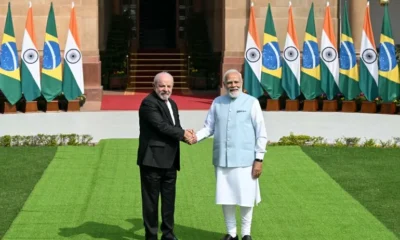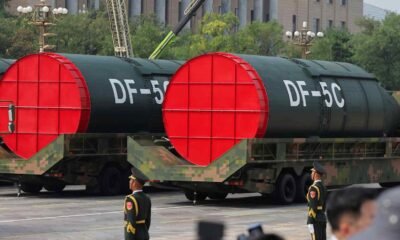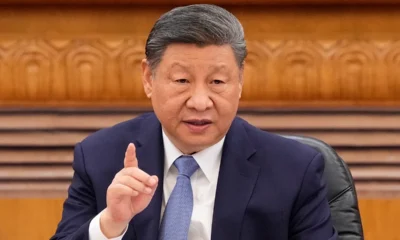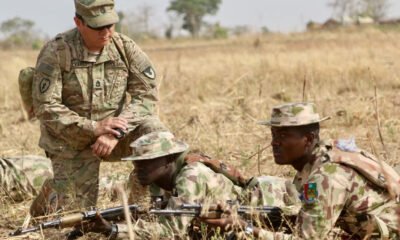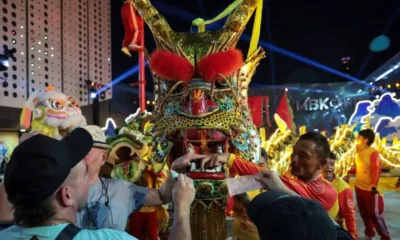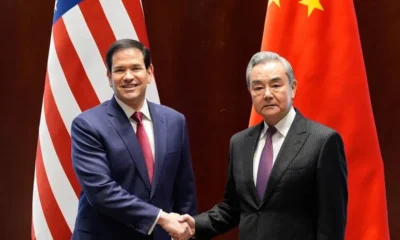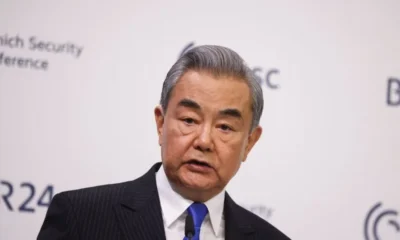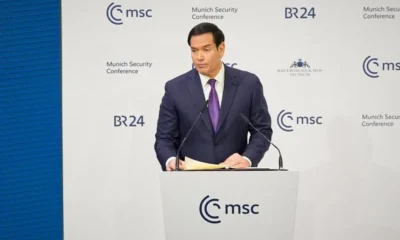Diplomacy
India’s Emerging Nexus with Somaliland: A Strategic and Historical Perspective

Diplomacy
Lindsey Accused of Sexist Remark Toward Danish PM
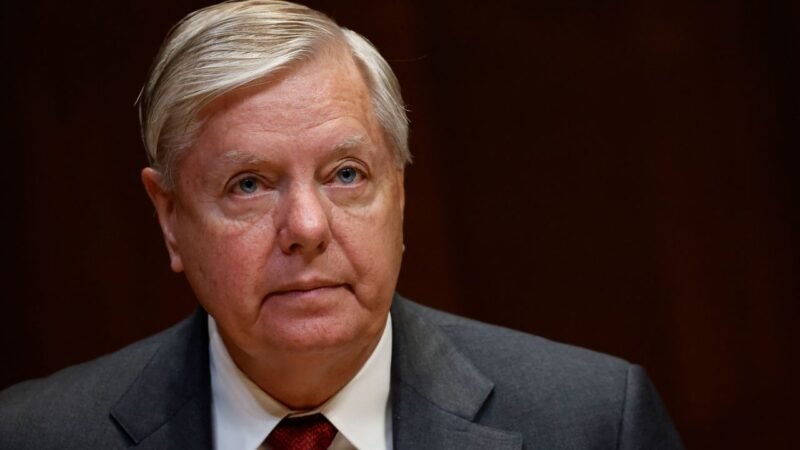
Did a U.S. senator just insult a NATO ally’s prime minister in the middle of a security summit? Witnesses say the room went silent.
U.S. Senator Lindsey Graham has been accused of making sexist and inappropriate remarks during a diplomatic meeting in Munich with Denmark’s prime minister and Greenland’s leader, according to multiple media reports.
The meeting, held on the sidelines of the Munich Security Conference, included Denmark’s Prime Minister Mette Frederiksen and Greenlandic Prime Minister Jens-Frederik Nielsen. It focused on tensions surrounding former President Donald Trump’s past threats to annex Greenland, an autonomous territory within the Kingdom of Denmark and a NATO ally.
According to accounts cited by Danish newspaper Berlingske and first reported by Puck, Graham allegedly addressed Frederiksen as “little lady” during the talks, a remark described by witnesses as “disturbing,” “shocking” and “extremely inappropriate.” The reports also allege that he yawned in Nielsen’s face in a manner perceived as mocking.
Sources cited in the coverage described Graham as combative and using profane language during the exchange. One attendee reportedly compared his behavior to “Graham on his worst TV day.”
Democratic Senator Elissa Slotkin, who was said to be present, allegedly left the meeting in shock before later returning. The Independent reported that it had sought comment from both Graham and Slotkin.
Frederiksen, according to accounts of the meeting, remained composed. Witnesses said she waited for Graham to finish before telling him that once he was done, the meeting could continue.
The reported incident comes at a sensitive moment in transatlantic relations. The question of Greenland’s strategic importance has resurfaced in recent years, particularly amid renewed U.S. interest in Arctic security and resource access.
If confirmed, the exchange could add strain to already delicate diplomatic ties, particularly as European leaders weigh Washington’s posture toward allies and NATO partners.
Diplomacy
JD Vance Says Iran Still Rejecting Trump’s Red Lines
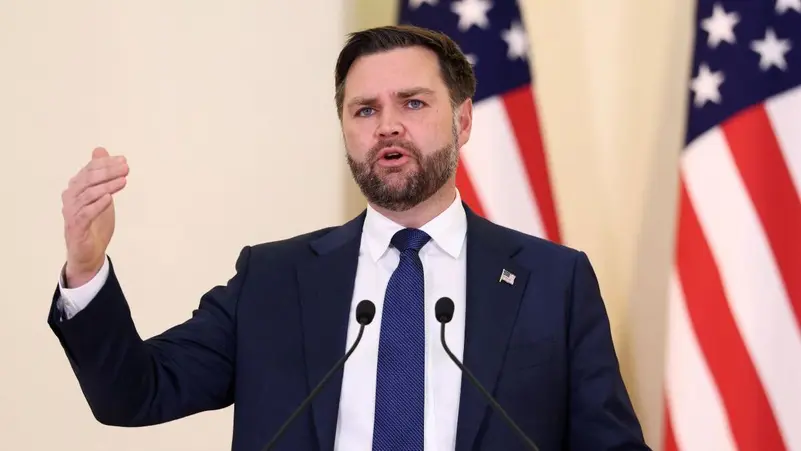
Diplomacy continues — but threats are getting louder on both sides.
Vice President JD Vance said Tuesday that Iran has yet to accept key “red lines” set by President Donald Trump, even as both sides agreed to continue negotiations following high-stakes talks in Geneva.
“In some ways, it went well; they agreed to meet afterwards,” Vance said in a Fox News interview. “But in other ways, it was very clear that the president has set some red lines that the Iranians are not yet willing to actually acknowledge and work through.”
Vance signaled Washington remains open to diplomacy but warned that Trump could ultimately decide talks have run their course. “We’re going to keep on working it,” he said. “But the president reserves the ability to say when he thinks diplomacy has reached its natural end.”
The remarks came as Iran’s Supreme Leader Ayatollah Ali Khamenei escalated rhetoric, declaring that Tehran has the capability to sink a U.S. warship in the Gulf. His comments followed the deployment of two American aircraft carriers to the region, including the USS Abraham Lincoln, positioned within striking range of Iranian territory.
“A warship is certainly a dangerous weapon,” Khamenei said. “But even more dangerous is the weapon capable of sinking it.”
The talks, mediated by Oman and held at the Omani ambassador’s residence in Geneva, are aimed at averting possible U.S. military action. President Trump has repeatedly threatened force if Iran refuses to curb its nuclear program. On Friday, he said regime change in Tehran “would be the best thing that could happen.”
Iran insists negotiations must focus strictly on nuclear issues. Washington, however, has pushed to broaden discussions to include Tehran’s ballistic missile program and its support for armed groups across the Middle East.
Foreign Ministry spokesman Esmail Baghaei said sanctions relief must be central to any agreement, describing it as “an integral part” of a deal.
Meanwhile, Iran’s Islamic Revolutionary Guard Corps launched military exercises in the Strait of Hormuz, a strategic shipping route for global oil and gas. State television reported temporary closures in parts of the waterway for safety during the drills.
U.S. Secretary of State Marco Rubio struck a more measured tone, saying, “We’re hopeful there’s a deal,” while emphasizing Trump prefers a negotiated outcome.
Iranian Foreign Minister Abbas Araghchi also expressed cautious optimism, saying he arrived in Geneva with “real ideas to achieve a fair and equitable deal,” but warned there would be no “submission before threats.”
With military forces on alert and diplomacy still fragile, the negotiations remain balanced between breakthrough and breakdown — and the consequences of failure could extend far beyond the Gulf.
Diplomacy
Netanyahu to Meet Trump in Washington to Discuss Iran Nuclear Talks
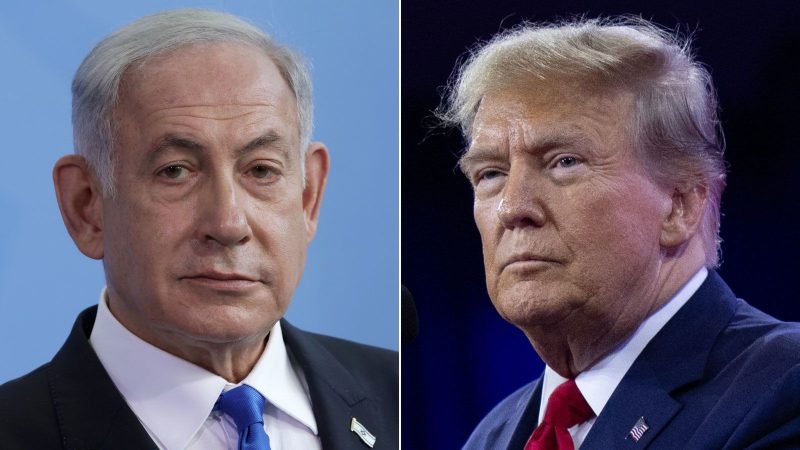
Israeli Prime Minister Benjamin Netanyahu is scheduled to meet U.S. President Donald Trump in Washington on Wednesday, with discussions expected to focus on Iran’s nuclear programme and recent indirect talks between Washington and Tehran.
Netanyahu’s office said the Israeli leader believes any negotiations with Iran must go beyond uranium enrichment and include limits on Iran’s ballistic missile programme, as well as an end to Tehran’s support for allied militant groups across the Middle East.
The meeting comes days after indirect US–Iran talks in Oman appeared to circle back to fundamental disagreements over how negotiations should proceed.
Trump described the Oman talks as “very good” and said further discussions were planned for early next week. The US delegation was led by Middle East envoy Steve Witkoff alongside Jared Kushner, the president’s son-in-law.
Despite the diplomatic push, Trump has repeatedly threatened military action if Iran refuses to accept a new nuclear deal, while reinforcing US military presence in the region with additional warships and an aircraft carrier.
Iranian Foreign Minister Abbas Araghchi responded sharply over the weekend, saying US military deployments “do not scare” Tehran. He insisted Iran would not abandon uranium enrichment, even under the threat of war, and reiterated that Iran’s missile programme was “never negotiable.”
Araghchi also warned that Iran would target US bases in the region if attacked, citing deep distrust following last year’s conflict, when US strikes hit Iranian nuclear facilities during fighting between Israel and Iran.
While calling the talks a “good start,” Araghchi said rebuilding trust would take time, accusing the United States and Israel of pursuing a “doctrine of domination” that allows Israel to expand its military capabilities while pressuring others to disarm.
With talks set to resume soon, Netanyahu’s meeting with Trump is expected to shape Washington’s next steps as diplomatic efforts with Tehran remain fragile and highly contested.
Diplomacy
Trump Sends US Military Chiefs to Negotiate Iran and Ukraine

From missiles to meetings — Trump puts America’s generals on the diplomatic front line.
President Donald Trump has turned to senior U.S. military leaders for unusually prominent diplomatic roles, dispatching top commanders to negotiations on Iran’s nuclear program and efforts to end the war in Ukraine.
The head of U.S. Central Command, Adm. Brad Cooper, joined indirect U.S.–Iran talks in Oman on Friday, marking the first time a serving CENTCOM commander has taken part in such negotiations. Cooper appeared in full uniform, underscoring Washington’s military buildup in the region as Trump presses Tehran to accept limits on its nuclear program.
At the same time, Army Secretary Dan Driscoll has emerged as a key intermediary in talks aimed at ending the Russia–Ukraine war. Driscoll participated in recent negotiations in Abu Dhabi, maintaining contact with Ukrainian officials between formal sessions and acting as a liaison to Trump’s inner circle.
The move reflects a broader shift in Trump’s foreign policy style, relying on military leaders alongside civilian envoys to signal resolve and keep pressure on adversaries. Analysts say Cooper’s presence in the Iran talks was intended to reinforce the implicit threat of force, while also bringing technical military expertise to discussions over nuclear capabilities.
Trump said the Oman talks were “very good” but warned of “very steep” consequences if Iran refuses a deal. Meanwhile, Driscoll’s involvement has helped reopen high-level military-to-military dialogue between Washington and Moscow, suspended since Russia’s invasion of Ukraine.
Critics argue the approach sidelines traditional diplomacy, while supporters note that U.S. presidents have historically used trusted military figures as emissaries during moments of heightened global tension.
Diplomacy
Abiy Links Renewable Energy Drive to Horn of Africa Integration
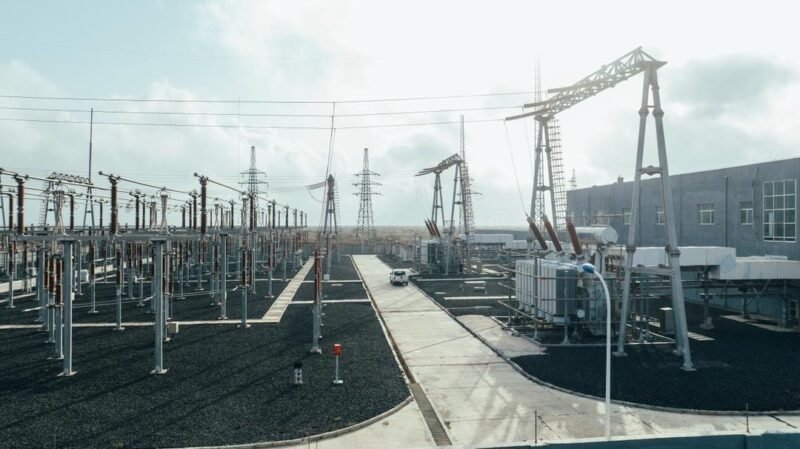
Ethiopia Frames Clean Energy Push as Regional Project, Linking Power Growth to Cross-Border Integration.
Ethiopia is no longer presenting clean energy as a domestic development project. It is framing it as a regional system, one that binds neighbors together through power lines, shared infrastructure, and economic interdependence.
Prime Minister Abiy Ahmed’s remarks at the inauguration of the Aysha II Wind Power Project made that strategy explicit. Standing alongside Djibouti’s President Ismail Omar Guelleh and Somalia’s President Hassan Sheikh Mohamud, Abiy cast Ethiopia’s renewable energy drive as inseparable from cross-border connectivity and regional cooperation.
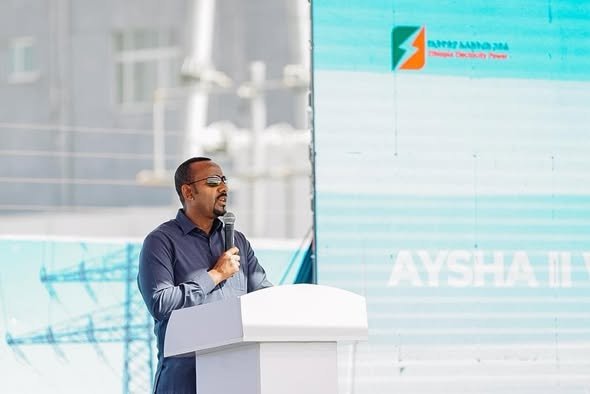
Prime Minister Abiy Ahmed
The symbolism of the location mattered. Aysha II sits in Ethiopia’s Somali Region, a peripheral area historically associated with marginalization rather than national transformation. By placing a major wind project there, Addis Ababa is signaling that its energy transition is also a political project—one aimed at integrating border regions into national and regional economic systems.
With a total planned capacity of 120 megawatts and 80 megawatts already feeding the national grid, Aysha II is modest compared with hydropower giants like the Grand Ethiopian Renaissance Dam. But its strategic value lies elsewhere. Wind power diversifies Ethiopia’s energy mix, reduces dependence on rainfall-dependent hydropower, and supports a narrative of climate-aligned growth that resonates with international partners.
Abiy’s repeated emphasis on regional integration reflects a deeper calculation. Ethiopia’s economic ambitions exceed what its domestic market alone can absorb. Power exports to Djibouti already generate revenue and political leverage. Expanding energy and transport links with Somalia and South Sudan would extend that influence, turning Ethiopia into a regional energy hub rather than just a large consumer.
The reference to the GERD reinforces this framing. By portraying the dam as an African achievement built with domestic resources, Abiy is positioning Ethiopia as proof that large-scale clean energy projects can be delivered without external dependency. At the same time, the dam remains a reminder that energy projects in the Horn are never purely technical. They reshape regional politics, provoke disputes, and redefine power relations.
This is why Abiy pairs energy with diplomacy. Cooperation with Djibouti on power, water and infrastructure offers a model of pragmatic integration. Engagement with Somalia carries higher political risk but also higher strategic payoff, especially as Addis Ababa seeks diversified access routes and economic corridors in a volatile region.
Hosting the upcoming COP-32 Summit adds another layer. Ethiopia intends to use the platform to present itself as a continental leader on climate and development, leveraging its renewable portfolio to attract financing, legitimacy and partnerships. Clean energy becomes both a development tool and a diplomatic asset.
The broader message is clear. Ethiopia is betting that shared infrastructure can stabilize relationships in a region marked by conflict and mistrust. Power lines, in this vision, are not just conduits for electricity but for influence and interdependence.
Whether that bet pays off will depend on political realities beyond turbines and grids. Regional tensions, internal conflicts, and competing ambitions could just as easily turn energy into a new fault line. For now, Addis Ababa is pushing a confident narrative: that East Africa’s future will be cleaner, more connected, and more integrated—and that Ethiopia intends to sit at the center of it.
Diplomacy
Trump Threatens 200% Tariffs on French Wine After Paris Rejects ‘Board of Peace’
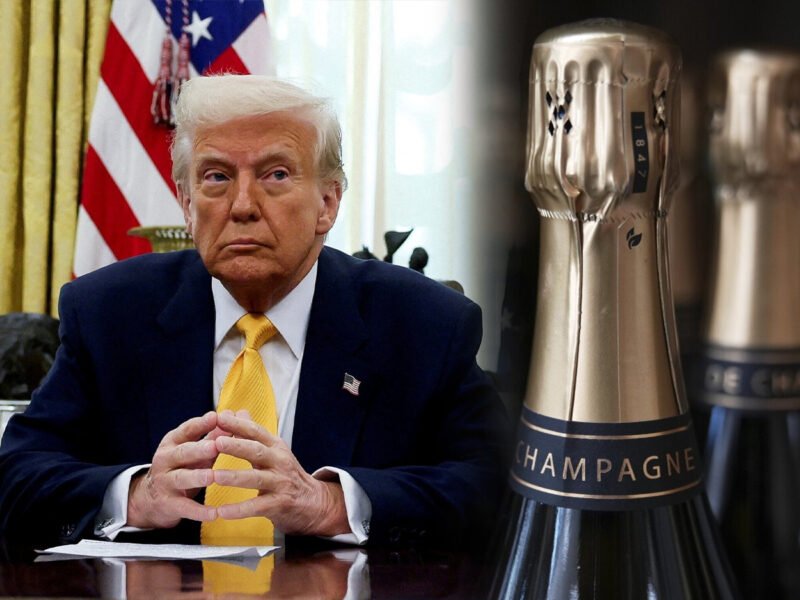
From Gaza to Greenland, Trump turns tariffs into leverage—and Europe into the test case.
U.S. President Donald Trump has escalated his trade-as-coercion strategy, threatening a 200% tariff on French wine and champagne after France signaled it would not join his proposed international “Board of Peace.”
The threat came after an aide to French President Emmanuel Macron said Paris “does not intend” to accept an invitation to the board, an initiative Trump first floated last September as part of a plan to end the Gaza war but has since expanded into a loose framework for mediating global conflicts.
“Nobody wants him because he’s going to be out of office very soon,” Trump said when told of Macron’s likely refusal. “I’ll put a 200% tariff on his wines and champagnes and he’ll join—but he doesn’t have to join.”
Macron’s term runs until May 2027, and French officials have so far dismissed Trump’s remarks as political theater. But the threat underscores a broader shift: tariffs are no longer just economic tools in Trump’s playbook—they are instruments of diplomatic pressure.
According to a draft charter seen by Reuters, countries invited to the Board of Peace would be expected to contribute $1 billion in cash to secure membership beyond three years. The document proposes Trump as the board’s inaugural chairman, with authority over membership decisions. Invitations reportedly went out to a wide—and controversial—list of leaders, including Vladimir Putin, UK Prime Minister Keir Starmer, Belarusian leader Alexander Lukashenko, and Indian Prime Minister Narendra Modi.
Critics warn the board could undermine the United Nations by creating a parallel, pay-to-participate forum with unclear mandates and opaque decision-making. The publication by Trump of a private text exchange with Macron—shared on Truth Social—has only deepened concerns about the initiative’s seriousness and intent.
The dispute also folds into a wider transatlantic clash. Washington has already warned that eight European countries—Denmark, Norway, Sweden, France, Germany, the UK, the Netherlands, and Finland—could face 10% tariffs from February unless they support U.S. efforts to acquire Greenland, a move Europe has rejected as a violation of Danish sovereignty.
EU officials are weighing retaliatory options, including tariffs on €93 billion worth of U.S. goods and the activation of the bloc’s anti-coercion instrument, designed to counter economic pressure used to force policy change.
“I don’t think they’re going to push back too much,” Trump said of Europe. “We have to have it… They can’t protect it.”
For Europe, the pattern is becoming unmistakable: sovereignty disputes, security alliances, and economic penalties are being braided together. For Washington, the message is equally clear—participation is optional, but resistance may come at a steep price.
Diplomacy
Ethiopia–Israel Axis Strengthens as Regional Stakes Rise
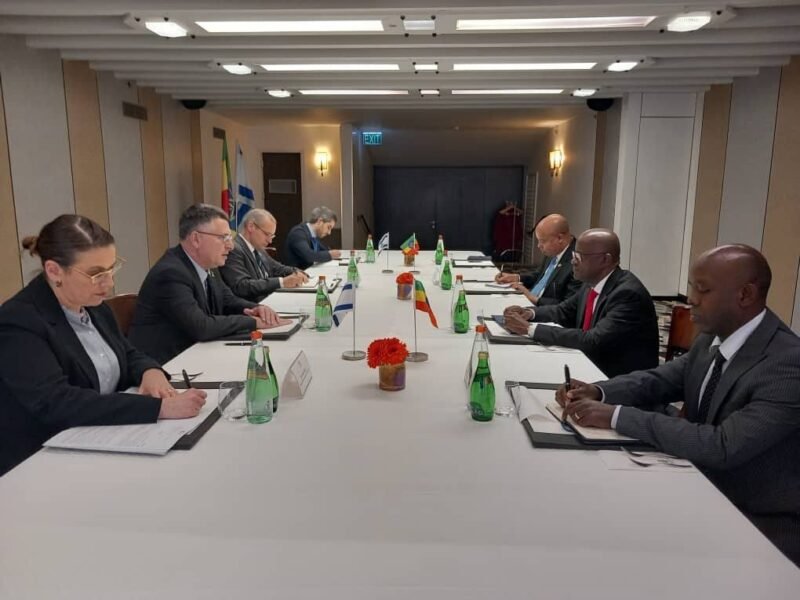
Ethiopia and Israel Reaffirm Strong Ties Ahead of Fourth Political Consultation in Jerusalem.
Ethiopia and Israel are moving to consolidate a quietly resilient partnership at a moment of heightened geopolitical flux in the Horn of Africa and the Middle East. Talks this week between Ethiopia’s State Minister for Foreign Affairs, Ambassador Hadera Abera, and Israeli Foreign Minister Gideon Sa’ar signal continuity — and strategic intent — ahead of the fourth Ethio–Israel Political Consultation set to take place in Jerusalem.
The discussions focused on deepening bilateral cooperation, with particular emphasis on economic ties, while also addressing regional and multilateral issues of shared concern.
For Addis Ababa, the engagement reinforces its long-standing diplomatic balance: maintaining Western, Middle Eastern, and emerging partnerships as it navigates post-conflict recovery and regional competition.
For Israel, Ethiopia remains a pivotal African partner — politically influential, demographically significant, and strategically located near the Red Sea corridor.
The timing matters. With shifting alliances in the Horn, rising Red Sea security tensions, and Israel expanding its diplomatic footprint in Africa, the reaffirmation of ties with Ethiopia reflects a broader effort to anchor stability through pragmatic cooperation rather than ideology.
What stands out is consistency. While the region experiences rapid realignments, Addis Ababa and Jerusalem are signaling that their relationship is institutionalized, forward-looking, and insulated from short-term turbulence.
The upcoming political consultation in Jerusalem is expected to translate diplomatic warmth into concrete economic and strategic initiatives.
In a region defined by uncertainty, Ethiopia and Israel are betting on continuity — and on each other.
Diplomacy
Somaliland Recalls Ambassador to Djibouti as Post-Recognition Tensions Escalate

Somaliland Pulls Envoy From Djibouti After Israel Recognition.
The Republic of Somaliland has formally recalled its ambassador to Djibouti for consultations, signaling a sharp escalation in diplomatic tensions following Israel’s recognition of Somaliland as a sovereign state.
In an official statement released Wednesday, the Ministry of Foreign Affairs and International Cooperation confirmed that Somaliland’s representative to Djibouti has returned to Hargeisa “as part of ongoing diplomatic engagements and in line with established diplomatic practice.”
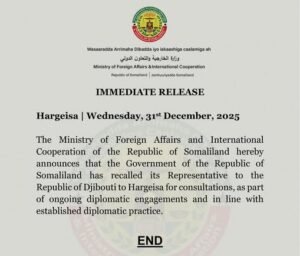
Officials separately confirmed that Djibouti’s ambassador to Somaliland also departed Hargeisa on Wednesday morning for Djibouti, indicating that both governments have summoned their envoys simultaneously—a classic diplomatic signal of protest short of cutting ties.
Regional analysts say the move is directly linked to Djibouti’s public opposition to Somaliland’s growing international recognition, particularly after Israel became the first UN member state to formally recognize Somaliland’s independence.
“This is a calibrated warning shot,” one regional diplomat said. “Recalling ambassadors for consultations is how states signal deep dissatisfaction without crossing into full diplomatic rupture.”
Djibouti has positioned itself firmly against Somaliland’s recognition drive, aligning with Somalia and other regional actors resisting changes to the Horn of Africa’s political map. That stance has increasingly strained relations between the two neighbors, especially as Somaliland gains new strategic relevance along the Gulf of Aden and Red Sea corridor.
The dual recalls underscore how Israel’s recognition has triggered real-world diplomatic consequences across the Horn, reshaping alliances and forcing regional capitals to choose sides.
For now, channels remain open. But the message from Hargeisa is unmistakable:
Somaliland is no longer absorbing opposition quietly—and it expects its sovereignty to be treated as a political reality, not a theoretical debate.
-

 Minnesota2 months ago
Minnesota2 months agoFraud Allegations Close In on Somalia’s Top Diplomats
-

 Middle East2 months ago
Middle East2 months agoTurkey’s Syria Radar Plan Triggers Israeli Red Lines
-

 Editor's Pick2 months ago
Editor's Pick2 months agoWhy India Is Poised to Become the Next Major Power to Recognize Somaliland
-

 ASSESSMENTS2 months ago
ASSESSMENTS2 months agoSomalia’s Risky Pact with Pakistan Sparks Regional Alarm
-

 Analysis2 months ago
Analysis2 months agoTurkey’s Expanding Footprint in Somalia Draws Parliamentary Scrutiny
-

 Analysis2 months ago
Analysis2 months agoRED SEA SHOCKER: TURKEY’S PROXY STATE RISES—AND ISRAEL IS WATCHING
-

 Somaliland1 month ago
Somaliland1 month agoF-35s Over Hargeisa: The Night Somaliland’s Sovereignty Went Supersonic
-

 Somalia2 months ago
Somalia2 months agoIs Somalia’s Oil the Price of Loyalty to Turkey? MP Blows Whistle on Explosive Oil Deal


